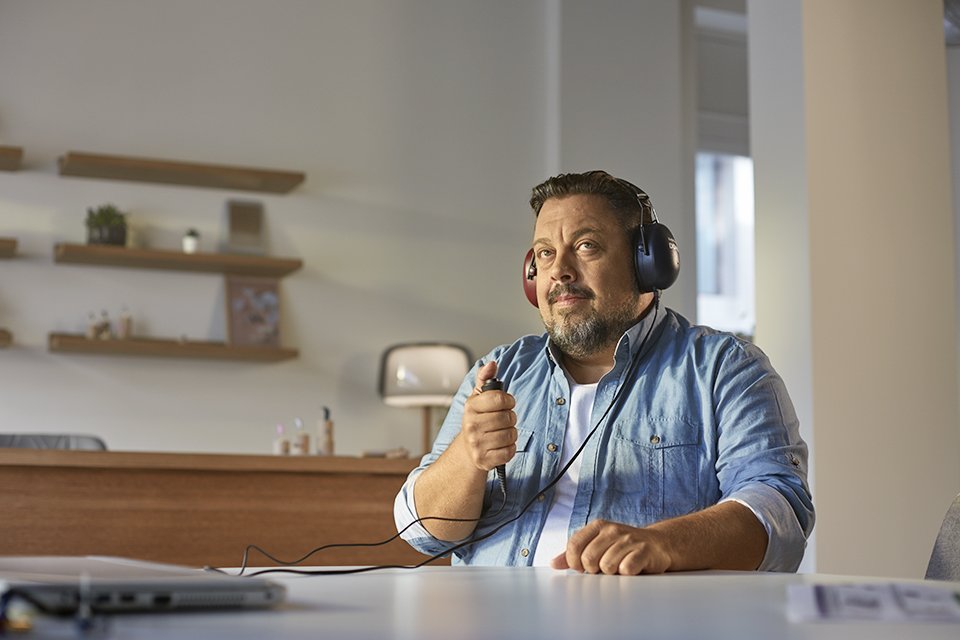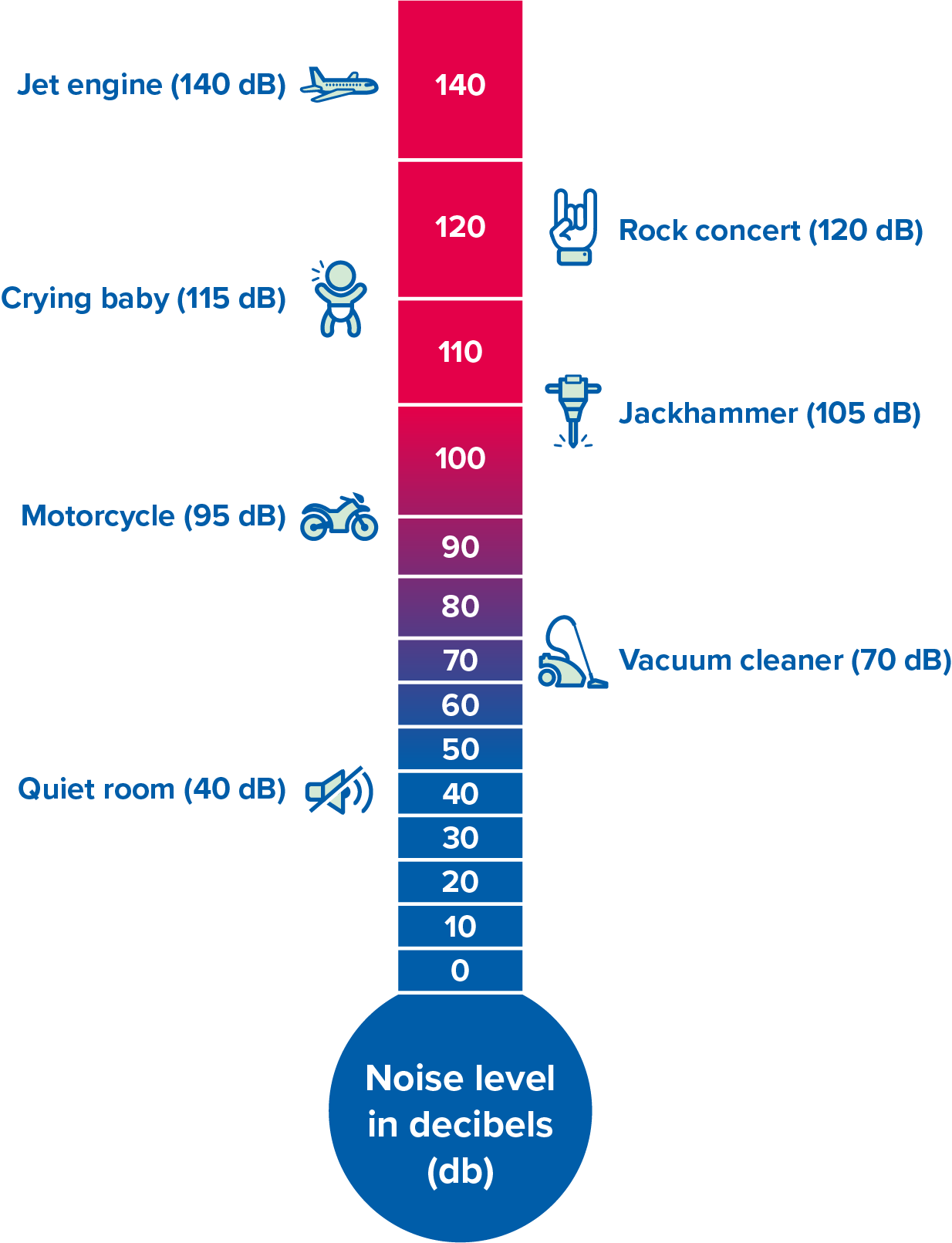Ask yourself: Do you need a hearing test?
Answer the four questions below to see if you should consider getting a hearing test.

While it can be easy to take your hearing for granted, it is one of your most valuable senses. Being able to hear clearly makes it possible for you to communicate, build relationships and unite with your friends and loved ones. Learn what you can do to protect this precious sense.
While age-related hearing loss cannot be prevented, noise-induced hearing loss is preventable.
There are a few simple rules you can follow to protect your hearing health as much as possible, regardless of your age.

Answer the four questions below to see if you should consider getting a hearing test.
Your answers indicate that you experience symptoms of hearing loss. We strongly recommend booking a hearing test at one of our clinics.
The result is an indication. An in-person hearing test can determine if you have a hearing loss.
Your answers indicate that you experience some symptoms of hearing loss. We recommend booking a hearing test at one of our clinics.
The result is an indication. An in-person hearing test can determine if you have a hearing loss.
Your answers do not indicate that you experience symptoms of hearing loss. However, if you experience trouble hearing, we recommend booking a hearing test at one of our clinics.
The result is an indication. An in-person hearing test can determine if you have a hearing loss.
Sounds are considered harmful when they exceed 85 dB, which is similar to the loudness of heavy traffic. Sound levels can soar to harmful levels in our everyday lives more often than you might think. Here are some noise comparisons for reference to help you limit your exposure to loud noises and thereby prevent hearing loss:

Do you suspect that you already have some degree of hearing loss?
It is important to seek help as soon as possible since untreated hearing loss can deteriorate over time. We recommend that you book a free hearing test when you recognize the early signs in order to reduce the risks of untreated hearing loss.
When to seek help
Custom ear plugs stand as a frontline defense against hearing loss, and their unique design plays a pivotal role in safeguarding your auditory health. Hearing loss often results from prolonged exposure to loud noises, which can cause irreparable damage to the delicate structures of the inner ear. Custom earplugs, with their tailored fit and advanced technology, are specifically engineered to mitigate these risks.
In noisy environments like concerts, construction sites, shooting ranges or factories, custom earplugs act as a barrier, protecting your ears without causing discomfort. Moreover, custom earplugs can be fine-tuned for specific activities. Musicians benefit from musician's earplugs, which maintain sound quality while providing protection, and swimmers can choose waterproof custom earplugs to keep water out and prevent ear infections. By investing in custom earplugs, you're not only ensuring your hearing remains intact but also enjoying life's vibrant sounds without worrying about hearing loss. Visit your nearest HearingLife clinic to explore your custom earplug options and take a proactive step toward preserving your hearing health.
Custom ear plugs are advanced hearing protection devices that are uniquely tailored to fit the contours of your ears. Unlike standard, one-size-fits-all ear plugs that provide a generic fit, custom ear plugs are individually crafted based on impressions of your ear canals. This personalized approach ensures a precise and comfortable fit, allowing the ear plugs to conform perfectly to the shape of your ears.
The process of obtaining custom ear plugs typically involves visiting a hearing care professional who will take impressions of your ears using specialized materials. These impressions are then used to create custom molds that serve as the basis for manufacturing your ear plugs. The result is a pair of ear plugs that are specifically designed to match the anatomy of your ears, providing a snug and secure seal.
One of the key advantages of custom ear plugs is their superior comfort and effectiveness compared to off-the-shelf alternatives. Because they are custom-made to fit your ears, they eliminate the discomfort and irritation often associated with generic ear plugs. The custom fit of these ear plugs ensures they stay in place and block out harmful noise without slipping or falling out.
Investing in custom ear plugs not only provides superior protection against noise-induced hearing loss but also offers unparalleled comfort and convenience. If you suspect any hearing issues, don't hesitate to book a free hearing test at your nearest HearingLife clinic to ensure optimal hearing health.
Custom ear plugs are available in a variety of specialized designs, each tailored to address specific needs and activities:
Musician Ear Plugs:
Musicians rely on their hearing to discern nuances in sound and deliver their best performances. However, exposure to loud music venues and rehearsals can pose a risk to their hearing health. Musician ear plugs are uniquely crafted to address this challenge. Unlike traditional foam ear plugs, which often distort sound and dampen frequencies unevenly, musician ear plugs offer flat attenuation. This means they reduce noise levels evenly across frequencies, preserving the natural quality of music while still providing essential protection against harmful noise levels. By maintaining clarity, musician ear plugs allow musicians to hear themselves and their fellow performers accurately, enabling them to perform confidently without compromising their hearing health.
Sleep Ear Plugs:
Quality sleep is essential for overall well-being, yet external noises can disrupt sleep patterns and lead to sleep deprivation. Sleep ear plugs are designed to address this issue by blocking out unwanted noise, creating a quieter sleep environment conducive to restfulness and relaxation. Whether it's the rumble of traffic, a partner's snoring, or noisy neighbors, sleep ear plugs help individuals achieve a deeper, more restorative sleep by minimizing disturbances. With improved sleep quality, individuals wake up feeling more refreshed and energized, ready to tackle the day ahead.
Swim Ear Plugs:
Water exposure can increase the risk of ear infections and other aquatic-related ear problems, particularly for swimmers and water sports enthusiasts. Swim ear plugs offer a practical solution by creating a watertight seal, preventing water from entering the ear canal during aquatic activities. Made from waterproof materials and custom-molded to fit each individual's ear shape, swim ear plugs effectively keep water out, reducing the likelihood of infections such as swimmer's ear. By maintaining ear health and comfort, swim ear plugs allow individuals to enjoy their time in the water without worrying about potential ear-related issues.
Industrial Ear Plugs:
In noisy work environments such as construction sites, factories, and airports, exposure to high noise levels is a common occupational hazard. Industrial ear plugs are specifically designed to provide reliable protection against occupational noise exposure, safeguarding workers' hearing health. Constructed from durable materials and custom-fitted to ensure a secure seal, industrial ear plugs effectively reduce noise levels, helping to prevent noise-induced hearing loss and other auditory problems. By wearing industrial ear plugs, workers can focus on their tasks with greater comfort and safety, minimizing the risk of long-term hearing damage associated with prolonged exposure to loud noise.
Our ears are incredibly sensitive organs, finely tuned to detect a vast range of sounds. However, when exposed to excessive noise levels, they can become vulnerable to damage. Noise-induced hearing loss (NIHL) occurs when prolonged or intense exposure to loud sounds damages the delicate hair cells in the inner ear, leading to permanent hearing impairment.
The impact of noise on hearing health cannot be overstated. Once hearing is damaged, it cannot be fully restored, making prevention critical. Custom ear plugs play a crucial role in protecting against NIHL by reducing the intensity of sounds reaching the inner ear. By providing a barrier between the external environment and the delicate structures of the ear, custom ear plugs help to limit exposure to harmful noise levels, preserving hearing function for the long term.
If you suspect you have hearing loss, it's essential to take proactive steps to address it. Book a free hearing test at your nearest HearingLife clinic today and take the first step towards preserving your hearing health.
Book a free hearing testOccupational and Recreational Noise Exposure
Noise exposure is a concern in both occupational and recreational settings. In the workplace, industries such as construction, manufacturing, and transportation expose workers to high levels of noise on a daily basis. Without adequate protection, workers are at risk of developing NIHL, which can have profound consequences for their quality of life and ability to perform their jobs safely and effectively.
Recreational activities such as attending concerts, sporting events, or using power tools also present risks to hearing health. Many people underestimate the potential harm posed by these seemingly harmless activities, but even short-term exposure to loud noises can cause irreversible damage to the ears.

The most common cause of tinnitus is due to loud noise that damages the sensory hair cells in the cochlea (a shell-like organ in the inner ear where sounds are converted into electrical signals.) Damage to the hair cells in our ear can cause both tinnitus and hearing loss.
In fact, more than 80% of people with tinnitus also experience some degree of hearing loss, but many tinnitus sufferers are not aware that their hearing is suffering too.